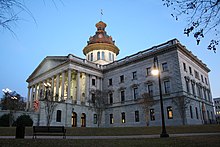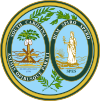South Carolina General Assembly
South Carolina General Assembly | |
|---|---|
 | |
| Type | |
| Type | Bicameral |
| Houses | Senate House of Representatives |
| Leadership | |
President of the Senate | Harvey S. Peeler Jr. (R) since January 8, 2019 |
Speaker of the House | Jay Lucas (R) since December 2, 2014 |
| Structure | |
| Seats | 170 voting members: 46 Senators 124 Representatives |
 | |
Senate political groups | Republican (27) Democratic (18) Vacant (1) |
 | |
House political groups | Republican (80) Democratic (44) Vacant (0)[1] |
| Elections | |
Senate last election | November 2016 |
House last election | November 2018 |
| Meeting place | |
 | |
South Carolina State House, Columbia | |
| Website | |
| http://www.scstatehouse.gov/ | |

Governor Donald Russell addressing the Assembly in 1964
The South Carolina General Assembly, also called the South Carolina Legislature, is the state legislature of the U.S. state of South Carolina. The legislature is bicameral and consists of the lower South Carolina House of Representatives and the upper South Carolina Senate. Altogether, the General Assembly consists of 170 members. The legislature convenes at the State House in Columbia.
Prior to the 1964 federal Reynolds v. Sims decision by the U.S. Supreme Court, the House of Representatives was apportioned so that each county had a number of representatives based on population, with each county guaranteed at least one Representative, while each county had one Senator. Moreover, each county's General Assembly delegation also doubled as its county council, as the state constitution made no provision for local government.
Reynolds v. Sims[2] caused district lines to cross county lines, causing legislators to be on multiple county councils. This led to the passage of the Home Rule Act of 1975, which created county councils that were independent of the General Assembly. However, some functions that in many other states are performed by county governments are still handled by county legislative delegations in South Carolina.[3]
There are 124 members of the South Carolina House of Representatives, who are elected every two years, and the South Carolina Senate has 46 members, elected every four years concurrent to the Presidential election. For both houses, there are no term limits. The General Assembly meets in joint session to elect judges, with all 170 members having an equal vote in such elections.
Contents
1 Officers
1.1 Senate
1.2 House of Representatives
2 See also
3 References
4 External links
Officers
Senate
South Carolina Senate Officers | ||
|---|---|---|
| Position | Name | Party |
| President of the Senate | Harvey S. Peeler Jr. | Republican |
| Majority Leader | A. Shane Massey | Republican |
| Minority Leader | Nikki G. Setzler | Democratic |
House of Representatives
South Carolina House of Representatives Officers | ||
|---|---|---|
| Position | Name | Party |
| Speaker | James H. "Jay" Lucas | Republican |
| Speaker pro tempore | Tommy Pope | Republican |
| Majority Leader | Gary Simrill | Republican |
| Minority Leader | J. Todd Rutherford | Democratic |
See also
- South Carolina State House
- South Carolina House of Representatives
- South Carolina Senate
- South Carolina Code of Laws
References
^ https://www.scstatehouse.gov/house.php
^ "Reynolds v. Sims 377 U.S. 533 (1964)". Justia Law. Retrieved 2016-05-12..mw-parser-output cite.citation{font-style:inherit}.mw-parser-output .citation q{quotes:"""""""'""'"}.mw-parser-output .citation .cs1-lock-free a{background:url("//upload.wikimedia.org/wikipedia/commons/thumb/6/65/Lock-green.svg/9px-Lock-green.svg.png")no-repeat;background-position:right .1em center}.mw-parser-output .citation .cs1-lock-limited a,.mw-parser-output .citation .cs1-lock-registration a{background:url("//upload.wikimedia.org/wikipedia/commons/thumb/d/d6/Lock-gray-alt-2.svg/9px-Lock-gray-alt-2.svg.png")no-repeat;background-position:right .1em center}.mw-parser-output .citation .cs1-lock-subscription a{background:url("//upload.wikimedia.org/wikipedia/commons/thumb/a/aa/Lock-red-alt-2.svg/9px-Lock-red-alt-2.svg.png")no-repeat;background-position:right .1em center}.mw-parser-output .cs1-subscription,.mw-parser-output .cs1-registration{color:#555}.mw-parser-output .cs1-subscription span,.mw-parser-output .cs1-registration span{border-bottom:1px dotted;cursor:help}.mw-parser-output .cs1-ws-icon a{background:url("//upload.wikimedia.org/wikipedia/commons/thumb/4/4c/Wikisource-logo.svg/12px-Wikisource-logo.svg.png")no-repeat;background-position:right .1em center}.mw-parser-output code.cs1-code{color:inherit;background:inherit;border:inherit;padding:inherit}.mw-parser-output .cs1-hidden-error{display:none;font-size:100%}.mw-parser-output .cs1-visible-error{font-size:100%}.mw-parser-output .cs1-maint{display:none;color:#33aa33;margin-left:0.3em}.mw-parser-output .cs1-subscription,.mw-parser-output .cs1-registration,.mw-parser-output .cs1-format{font-size:95%}.mw-parser-output .cs1-kern-left,.mw-parser-output .cs1-kern-wl-left{padding-left:0.2em}.mw-parser-output .cs1-kern-right,.mw-parser-output .cs1-kern-wl-right{padding-right:0.2em}
^ "Scoppe: The Home Rule Act that didn't really allow home rule". thestate. Retrieved 2016-05-12.
External links
- South Carolina Legislature Online
This South Carolina-related article is a stub. You can help Wikipedia by expanding it. |
